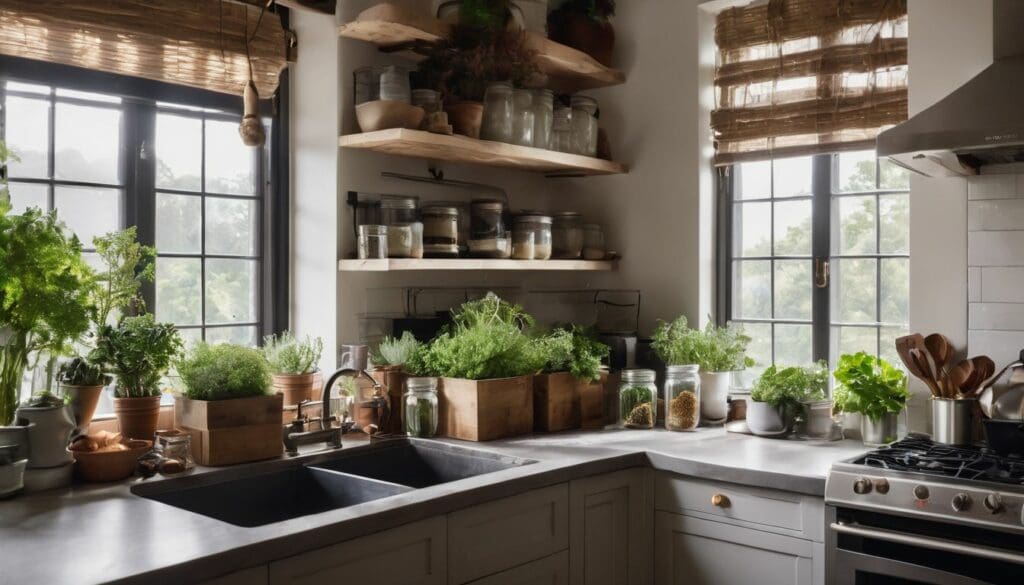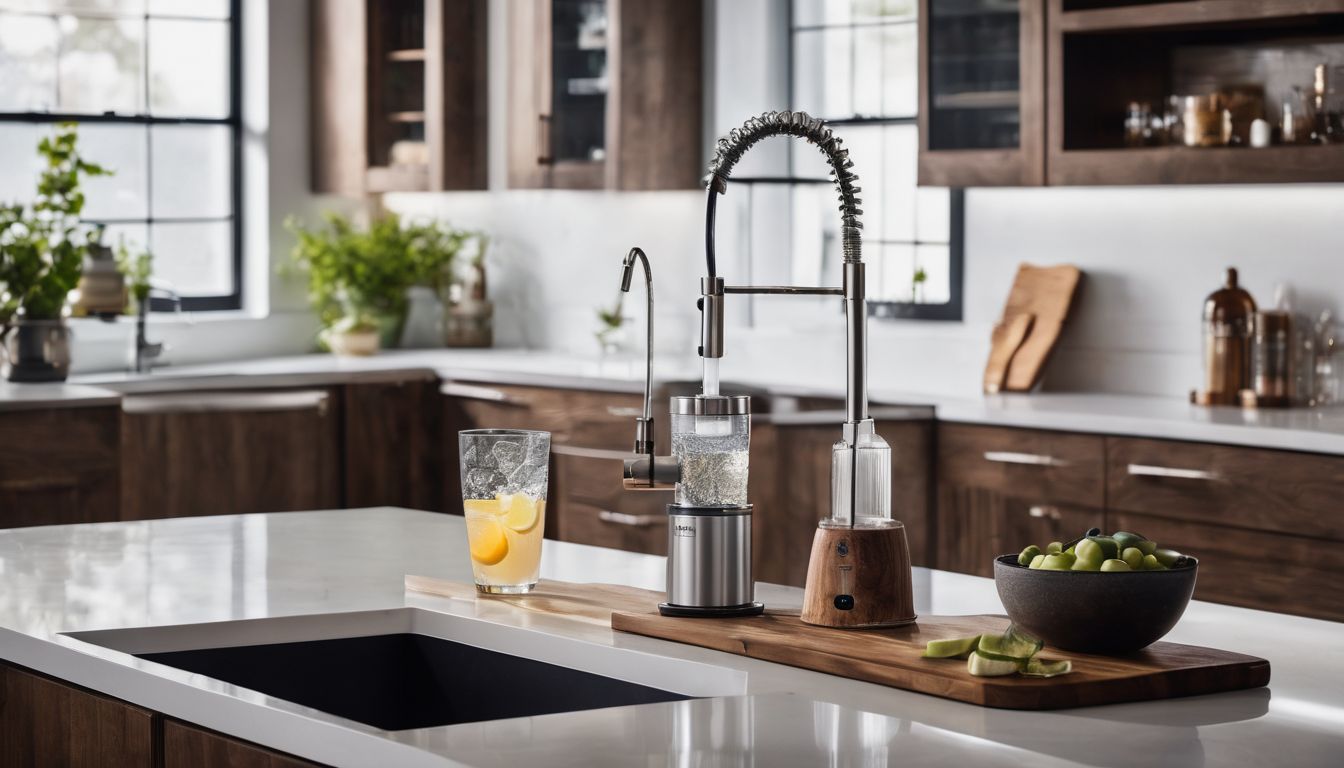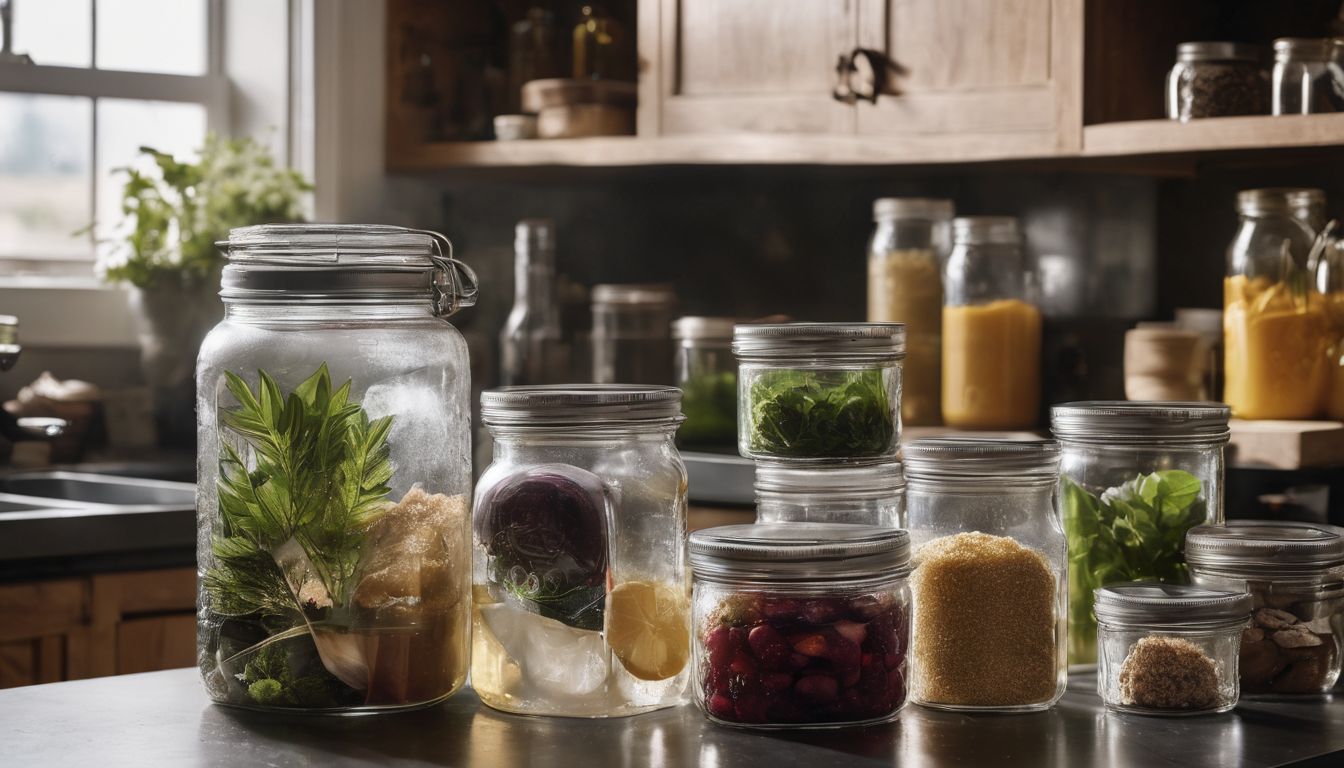Are you looking to reduce the clutter and waste in your home? Every year, tonnes of waste pile up in landfills, much of which comes from our households. This article will guide you through simple zero-waste practices that can transform your home into an eco-friendly haven.
Let’s start a greener journey together!
Key Takeaways
- Zero waste living reduces environmental impact by conserving resources and minimising landfill waste.
- Adopt the 5 R’s (Refuse, Reduce, Reuse, Recycle, and Rot) to start a zero waste lifestyle at home.
- Simple swaps in your bathroom, like bar soap and bamboo toothbrushes, help cut down on plastic use.
- Create a sustainable wardrobe through repairing clothes, shopping second-hand, and donating unwanted items.
- Grow your own produce and use composting methods to lessen kitchen waste.
What is Zero Waste?
Zero waste is a sustainable lifestyle that aims to reduce, reuse, and recycle as much as possible to minimize the amount of waste sent to landfills. It focuses on responsible consumption and resource conservation.
Definition
Zero waste is a sustainable living philosophy that aims to eliminate rubbish and encourage the responsible production, consumption, and recycling of products. It’s about rethinking our resources cycle so that all products are reused and nothing is sent to landfills or incinerators.
This approach complements an eco-friendly lifestyle by promoting conservation of natural resources and reducing our environmental footprint.
Adopting zero waste means embracing actions that lead to waste reduction at home, work, and in public spaces. People focused on green living look for ways to minimise what they discard, aiming for a minimalist lifestyle where items are valued more for their usefulness than their quantity.
By following this principle, environmental enthusiasts engage in practices like composting organic matter, upcycling materials creatively into new uses, and prioritising products with minimal or reusable packaging.
Benefits
By embracing a zero-waste lifestyle, you can significantly reduce your environmental impact. This approach helps to conserve natural resources and minimises the amount of waste sent to landfills or incinerators.
Additionally, adopting zero-waste practices can lead to cost savings as it encourages mindful consumption and promotes the use of reusable items instead of single-use products.
Living with minimal waste also contributes to a healthier planet by reducing air and water pollution while conserving energy. By choosing sustainable alternatives, you play a vital role in protecting ecosystems and wildlife.
How to Start a Zero Waste Lifestyle
To start living a zero waste lifestyle, it’s important to shift your mindset and approach to consumption. Embracing the 5 R’s – Refuse, Reduce, Reuse, Recycle, Rot – can help you make sustainable choices in your daily life.
Mindset shift
Embracing a zero waste lifestyle requires a fundamental mindset shift. It involves re-evaluating our relationship with consumption and waste. This change in perspective encourages us to focus on reducing, reusing, and recycling items rather than simply discarding them.
By prioritising sustainability and conscious consumption, individuals can make meaningful contributions to environmental conservation at home.
Transitioning to a zero waste mindset empowers individuals to become proactive agents of change in their daily lives. It involves being mindful of the environmental impact of one’s choices and embracing eco-friendly practices that minimise waste generation.
The 5 R’s (Refuse, Reduce, Reuse, Recycle, Rot)
To adopt a zero waste lifestyle, incorporating the 5 R’s is essential.
- Refuse: Say no to single-use plastics, unnecessary packaging, and disposable items.
- Reduce: Minimise consumption by purchasing only what is needed and avoiding excessive shopping.
- Reuse: Opt for durable and reusable products, such as water bottles, coffee cups, and shopping bags.
- Recycle: Utilise recycling facilities for materials like paper, glass, plastic, and metal to divert waste from landfills.
- Rot: Compost organic waste like food scraps and garden trimmings to enrich soil and reduce methane emissions.
Zero Waste Tips for Different Rooms in Your Home
Incorporate zero waste practices in every room of your home to reduce your environmental footprint. From using eco-friendly bathroom products to creating a sustainable wardrobe, there are many ways to make a positive impact.
Bathroom
Transform your bathroom into a sustainable space with simple eco-friendly practices. To achieve a zero waste home, consider the following tips for the bathroom:
- Use bar soap instead of liquid soap and shampoo to reduce plastic waste.
- Switch to bamboo toothbrushes to decrease plastic usage in your dental routine.
- Opt for reusable cotton pads or cloths instead of single-use makeup wipes.
- Refill containers for bathroom products at zero – waste shops or use DIY alternatives.
- Replace disposable razors with a safety razor that has replaceable blades.
- Install a low – flow showerhead to conserve water without sacrificing water pressure.
- Choose biodegradable toilet paper made from sustainable materials for an eco-conscious choice.
Wardrobe
Moving from sustainable practices in the bathroom to those in your wardrobe, here are some practical tips for achieving a zero waste lifestyle in this area:
- Mend or alter clothing instead of discarding it when it is damaged or no longer fits. This reduces the need for new purchases and extends the life of your wardrobe.
- Embrace a minimalist approach by curating a capsule wardrobe consisting of versatile, high-quality pieces that can be mixed and matched.
- Shop second – hand or swap clothes with friends and family to reduce the demand for new clothing production and minimise textile waste.
- Opt for natural fibres such as organic cotton, linen, or hemp which are biodegradable and have a lower environmental impact compared to synthetic materials.
- Clean clothes using eco-friendly detergents and practise air-drying rather than using a tumble dryer, reducing energy consumption and extending the lifespan of your clothing items.
- Donate unwanted clothing items to charity or textile recycling facilities instead of sending them to landfill, giving them a chance at a second life.
Kitchen
- Invest in reusable alternatives, such as cloth napkins and beeswax wraps, to eliminate single-use items.
- Use refillable containers for bulk purchases of pantry staples like grains, nuts, and spices to reduce packaging waste.
- Embrace composting to divert food scraps from landfill and create nutrient-rich soil for gardening.
- Opt for durable kitchen tools made from sustainable materials like bamboo or stainless steel instead of disposable plastic options.
- Choose energy – efficient appliances and utilise natural light whenever possible to reduce energy consumption.
Home Office
- Use digital documents and cloud storage instead of printing and filing papers.
- Invest in reusable and refillable office supplies such as pens, pencils, and markers.
- Opt for energy – efficient lighting and appliances to reduce electricity consumption.
- Implement a paperless billing system for all utilities and subscriptions.
- Donate or recycle old electronics instead of throwing them away.
- Set up a compost bin for any organic waste generated from office snacks or drinks.
Zero Waste Outside the Home
Embrace zero waste practices in your gardening and outdoor spaces to minimise your environmental impact. Dive deeper into these eco-friendly tips by reading the full blog.
Gardening
- Grow your own fruits, vegetables, and herbs in a backyard or community garden to reduce reliance on shop-bought packaged goods.
- Compost kitchen scraps for natural fertiliser, minimising the need for chemical-based products and reducing organic waste.
- Embrace native plants that require less water and maintenance, promoting a sustainable and biodiverse outdoor space.
- Utilise rain barrels to collect rainwater for irrigation, conserving water resources and reducing the environmental impact of watering systems.
- Implement natural pest control methods such as companion planting and introducing beneficial insects, eliminating the need for chemical pesticides.
Outdoor spaces
- Implement composting for organic waste to enrich the soil and reduce overall waste.
- Use water butts to collect water for gardening, reducing the use of potable water.
- Opt for natural landscaping methods that require minimal maintenance and chemicals.
- Repurpose old items as planters or decorations to minimise new purchases.
- Set up a designated area for recycling and ensure proper disposal of all materials.
Conclusion
FAQs
1. What are zero waste home practices?
Zero waste home practices involve adopting eco-friendly measures that reduce waste, like recycling, minimalism, and living a sustainable lifestyle.
2. How does minimalism relate to zero waste?
Minimalism helps in reducing the amount we consume and own, which naturally cuts down on the amount of waste we produce in our homes.
3. Can you give me some recycling tips for an eco-conscious lifestyle?
Sure! Start by sorting your rubbish correctly, repurpose items instead of throwing them away, and buy products with recyclable packaging to support your eco-conscious living.
4. Is it expensive to maintain an eco-friendly home?
Nope! Eco-friendly practices at home can save money in the long run as you’ll be using less and reusing more—an approach that’s both cost-effective and better for our planet.





